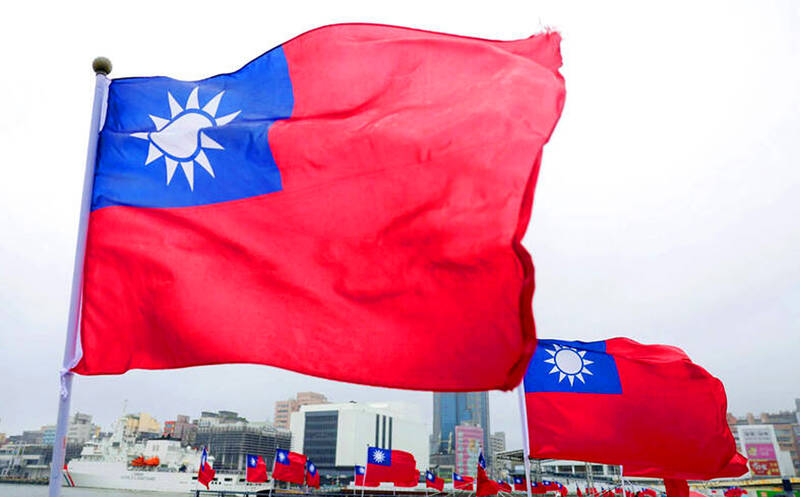Legislators have proposed amendments to broaden the criminal scope of organizations or people engaging in China’s “united front” activities and increase punishments.
As China’s “united front” tactics continue to intensify, President William Lai (賴清德) on March 13 instructed the government to propose responsive strategies.
Lawmakers of the Democratic Progressive Party (DPP), of which Lai is chairman, last week proposed three amendments.

Photo: I-Hwa Cheng, Bloomberg
DPP Legislator Wang Mei-hui (王美惠) proposed an amendment to the National Security Act (國家安全法) to include people or organizations which pass on instructions for “united front” activities through second or third-hand intermediaries under the jurisdiction of national security penalties.
Article 2 of the National Security Act says that “any person may not engage in the following acts for a foreign country, Mainland China, Hong Kong, Macau, foreign hostile forces, or various organizations, institutions, or groups established or substantially controlled by them or the persons dispatched by such organizations, institutions or groups.”
Wang’s proposed amendment adds “or receive or pass on instruction, commissions or funding from them.”
As current regulations only permit punishing the initiators of such organizations, the draft includes wording such as “operating, managing, or executing affairs,” expanding the criminal scope to those who are involved in these organizations.
The draft also stipulates that military personnel, civil servants or teachers who contravene the Anti-Infiltration Act (反滲透法) would be stripped of their retirement benefits, as it constitutes a betrayal of their duty to the nation.
DPP legislators Lai Jui-lung (賴瑞隆), Chuang Jui-hsiung (莊瑞雄) and Chen Kuan-ting (陳冠廷) proposed another amendment to the National Security Act to increase penalties by up to 50 percent for active or retired public servants who develop organizations on behalf of hostile foreign forces including those in China, Hong Kong and Macau.
The draft also stipulates that public servants who are sentenced to prison for three years or more, two to three years, or one to two years would have their retirement payments reduced by 50 percent, 30 percent and 20 percent respectively.
Increasing penalties by up to 50 percent would make China’s infiltration methods targeting active or retired military personnel, police, elected officials and civil servants less likely to succeed, Lai Jui-lung said.
DPP legislators Michelle Lin (林楚茵), Lee Po-yi (李柏毅) and Chen proposed an amendment to the National Intelligence Services Act (國家情報工作法) stipulating that those handling investigations into contraventions of the law must have professional national security knowledge.
In addition, the draft proposes harsher penalties for intelligence personnel who leak national security information.
Meanwhile, Taiwan People’s Party lawmakers have also proposed an amendment to the National Security Act, calling for heavier penalties against those who leak classified information to China, Hong Kong, Macau or other foreign hostile forces.
The draft also stipulates that if a civil servant or government agency director contravenes the Civil Servants’ Appointment Act (公務人員任用法) but fails to conduct a special review, the Directorate-General of Personnel Administration would impose a fine ranging of NT$1 million to NT$5 million (US$32,995 to US$164,973).

Taiwan is projected to lose a working-age population of about 6.67 million people in two waves of retirement in the coming years, as the nation confronts accelerating demographic decline and a shortage of younger workers to take their place, the Ministry of the Interior said. Taiwan experienced its largest baby boom between 1958 and 1966, when the population grew by 3.78 million, followed by a second surge of 2.89 million between 1976 and 1982, ministry data showed. In 2023, the first of those baby boom generations — those born in the late 1950s and early 1960s — began to enter retirement, triggering

ECONOMIC BOOST: Should the more than 23 million people eligible for the NT$10,000 handouts spend them the same way as in 2023, GDP could rise 0.5 percent, an official said Universal cash handouts of NT$10,000 (US$330) are to be disbursed late next month at the earliest — including to permanent residents and foreign residents married to Taiwanese — pending legislative approval, the Ministry of Finance said yesterday. The Executive Yuan yesterday approved the Special Act for Strengthening Economic, Social and National Security Resilience in Response to International Circumstances (因應國際情勢強化經濟社會及民生國安韌性特別條例). The NT$550 billion special budget includes NT$236 billion for the cash handouts, plus an additional NT$20 billion set aside as reserve funds, expected to be used to support industries. Handouts might begin one month after the bill is promulgated and would be completed within

NO CHANGE: The TRA makes clear that the US does not consider the status of Taiwan to have been determined by WWII-era documents, a former AIT deputy director said The American Institute in Taiwan’s (AIT) comments that World War-II era documents do not determine Taiwan’s political status accurately conveyed the US’ stance, the US Department of State said. An AIT spokesperson on Saturday said that a Chinese official mischaracterized World War II-era documents as stating that Taiwan was ceded to the China. The remarks from the US’ de facto embassy in Taiwan drew criticism from the Ma Ying-jeou Foundation, whose director said the comments put Taiwan in danger. The Chinese-language United Daily News yesterday reported that a US State Department spokesperson confirmed the AIT’s position. They added that the US would continue to

IMPORTANT BACKER: China seeks to expel US influence from the Indo-Pacific region and supplant Washington as the global leader, MAC Minister Chiu Chui-cheng said China is preparing for war to seize Taiwan, Mainland Affairs Council (MAC) Minister Chiu Chui-cheng (邱垂正) said in Washington on Friday, warning that Taiwan’s fall would trigger a regional “domino effect” endangering US security. In a speech titled “Maintaining the Peaceful and Stable Status Quo Across the Taiwan Strait is in Line with the Shared Interests of Taiwan and the United States,” Chiu said Taiwan’s strategic importance is “closely tied” to US interests. Geopolitically, Taiwan sits in a “core position” in the first island chain — an arc stretching from Japan, through Taiwan and the Philippines, to Borneo, which is shared by